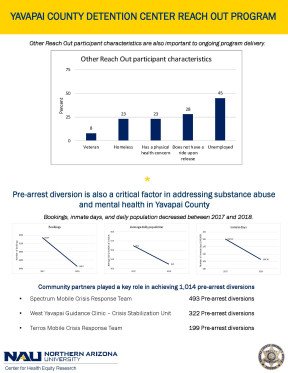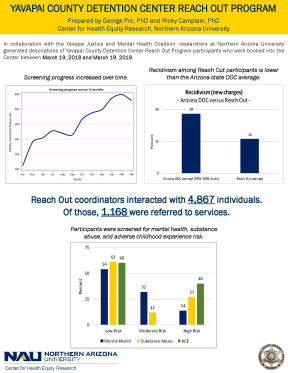Independent Study Results Released on this Innovative Program
 Prescott AZ (October 26, 2019) – In a one-year period, over 1000 individuals received service referrals that provided opportunity and hope through a link to critical, sometimes lifesaving, resources.
Prescott AZ (October 26, 2019) – In a one-year period, over 1000 individuals received service referrals that provided opportunity and hope through a link to critical, sometimes lifesaving, resources.
“The community service providers, law enforcement agencies, and court systems throughout Yavapai County have made it possible to connect individuals with unmet behavioral health needs, who interact with the criminal justice system, with appropriate services to meet those needs. The partnerships involved support the community at some of our most vulnerable moments and have demonstrated that holistic, collaborative efforts will provide multiple opportunities for lives to transform in a positive manner. We are building a foundation for the future with stories of success through alternatives to incarceration.”
— Beya Thayer, Executive Director, Yavapai Justice and Mental Health Coalition.
The Reach Out Program is a pilot project funded after legislative action on a bill signed by Governor Doug Ducey in May of 2018, earmarking $500,000 in funding over 3 fiscal years. A $250,000 grant from the Department of Justice was already in place and used to fund the onset of the program along with $224,290 authorized by County Attorney Shelia Polk provided to her office through legislation supporting pre-trial diversion programs. Part of the project directed an independent review following the first full year of the program. This study was prepared by Dr. George Pro and Dr. Ricky Camplain, faculty at Northern Arizona University, and is being shared to show the program’s effectiveness in the first full year.
 The Reach Out Initiative includes a team of stakeholders that cross over multiple systems, including mental health, substance use, law enforcement, pretrial services, courts, jails, community corrections, housing, health, social services, family members and many others.
The Reach Out Initiative includes a team of stakeholders that cross over multiple systems, including mental health, substance use, law enforcement, pretrial services, courts, jails, community corrections, housing, health, social services, family members and many others.
A major component of the program is the Pre-Arrest Diversion aspect utilized by specially trained law enforcement officers and 24/7 community Crisis Response Teams to provide mental health treatment and support to divert from jail.
The goal is to improve cross-system collaborations to reduce involvement in the justice system by people with mental and substance abuse disorders.
This involves FOCUSING ON THE WHOLE PERSON…
- 24/7 Crisis Hotline & mobile crisis outreach teams
- Transitioning inmates into appropriate mental health and substance use treatment
- Enhanced communication between courts, pretrial services, correctional health services, attorneys, probation and local behavioral health services.
- Access to recovery support, benefits, housing, and employment services.
Program Director Christine Hayes with Southwest Behavioral and Health Services: “The mission of Southwest Behavioral & Health Services is simple: We inspire people to feel better and reach their potential. Through helping people discover their strengths, we improve our communities. In the Yavapai County region, SB&H offers outpatient and opioid replacement services; and is currently partnering with Yavapai County to address the needs of people with behavioral health concerns who enter the justice system by providing a direct connection from jail to treatment. This entails assisting them with reconnecting to their clinical team, emphasizing accountability for criminal conduct, assisting participants in breaking the risk and recidivism cycle, and reducing burdens to the court while producing recovery based outcomes. The goal is to instill hope, empowerment, discovery, and self-determination to improve the well-being of the individual, while also making a positive impact to their families and the community as a whole.”
Chief Randy Taylor with Clarkdale Police Department: “Yavapai Justice and Mental Health Coalition is the quintessence of collaboration. The revolutionary accomplishments being attained through the multiple disciplines altruistically working together is something I have not witnessed in my 40 plus years of law enforcement. Being a part of something that benefits society to this extent is very rewarding.”
Executive Director Jessie Hans with CCJ: “At CCJ we hope to connect individuals with the very best resources to gain the dignity and resilience needed to overcome homelessness, becoming a part of the community as a whole. Our intention is to meet our clients as they are and help them to overcome challenges. Much of this work is done by referring our clients to the best local resources and guiding them through those systems. Yavapai’s Reach Out is a partner, advocate, and catalyst for this type of work. We also have our own ability to create solutions when there are no resources that are a good match. This is a healthy back and forth process with other organizations in order to optimize each community solution by working as a team. We hope to end homelessness and become a preventative program within the coming years. With our community partners, we are well on our way!”
The Sheriff’s Office is grateful to the NAU Professors for their work on this study.
Further information on the Reach Out program may be obtained by contacting Beya Thayer, MSW, Executive Director of the Yavapai Justice & Mental Health Coalition, at 928-554-8820 or Beya.Thayer@yavapai.us.




